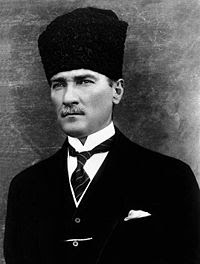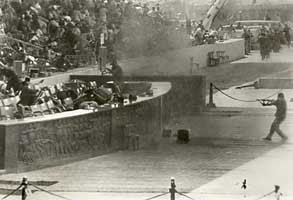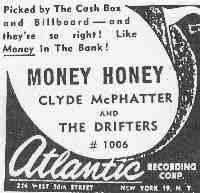History Happy MLK Day
posted by on January 21 at 12:03 PM
The notion that Mustafa Kemal Ataturk’s sweeping Turkish revolution gave us record company man Ahmet Ertegun—the guy who revolutionized America by churning out early rock and roll records in the late 1940s and 1950s—is worth savoring.
Check it out: An exile from Sunni Islam, a Turk, comes to America where he hooks up with blacks and Jews (and white country players as well) to create rhythm & blues, rock ‘n’ roll, civil rights, electric signal generations. This is a jolt to extremist Sunni Islam losers like al Qaeda, who cling to their 7th Century fetishism.
On October 29, 1923—some three months after Ahmet Ertegun was born—President Mustafa Kemal declared Turkey a republic. He diminished the power of Islam, rid the Turkish language of all Arabic words, and began the long process of dragging his country into the twentieth century.
To my glee, this is the first sentence of the book I started reading this week, “Music Man: Ahmet Ertegun, Atlantic Records, and the Triumph of Rock’N’Roll.”
Beginning Ertegun’s biography by instantly linking his legacy to Kemal Ataturk’s secularist revolution—Kemal abolished the Caliphate in March 1924—is a canny move by authors Dorothy Wade and Justine Picardie.
Sometime last year, when I found out Ertegun was Turkish—I’d always thought he was Jewish—my mind exploded in the flash of a 20th Century unifying theory where Ataturk’s anti-fundamentalist revolution is extended into America by Ertegun’s R&B revolution, and stands today through America’s lovely affront to Caliphate fetishists like al Qaeda.
Here’s my big theory.
In addition to being the father of modernization (Turkey is a secular beacon in the Islamic world), Ataturk was—unwittingly—the father of radical Islamic fundamentalism as well. Ataturk’s rise fostered a backlash, creating the Muslim Brotherhood, the progenitor of al Qaeda.
Quick history: In 1928, when Ataturk’s secular movement began redefining the Muslim world at large, angry reactionaries like Egypt’s Hasan al-Bana founded the Muslim Brotherhood. The Brotherhood’s most famous adherent was philosopher Sayyid Qutb, the religious intellectual who’s right wing writings about orthodox Islamic governance and the dangers of Western influence mesmerized a generation of Egyptian youth who came of age in the late 60s. These campus radicals—they were ultra conservatives (it became fashionable for the women in their set to wear the veil)—defined themselves in opposition to then-Egyptian President Gamal Nasser. Nasser’s Pan-Arab Socialism was a 1960s, left-wing version of Ataturk’s secular nationalism of the 1920s and 30s.
One anti-Nasser radical was Ayman al-Zawahiri. As a teen in the 1960s wrapped up in Qutb’s rhetoric (Nasser sentenced Qutb to death in 1966), Zawahiri founded a radical off-shoot of the Brotherhood called al-Jihad. Al-Jihad was implicated in the terrifying 1981 assassination of Anwar Sadat, Nasser’s successor. At their trial, the assassins decorated their holding cages with banners proclaiming the “caliphate or death.”*
Zawahiri went underground and continued his jihad in the late 80s by joining forces with Saudi Arabian Islamist cohort Osama bin Laden, eventually creating al Qaeda.
Of course, al Qaeda’s war is not so much focused on the apostates in the Muslim world like Egypt’s Nasser anymore. The central villain in al Qaeda’s equation is the United States. This is where rhythm and blues comes in.
Rhythm and blues is the “Satanic” American hybrid that blossomed at small independent race record labels like Specialty, Chess, and Ertegun’s own Atlantic in the late 1940s and early 1950s. R&B, a term coined by Ertegun’s white, Jewish partner at Atlantic, Jerry Wexler, was synonymous at the time with the burgeoning civil rights movement. And as R&B transformed into rock ‘n’ roll in the mid 50s—and into rock, soul, and pop in the mid 60s —this American music became synonymous with the cultural movement that turned America into the kind of open society that threatens religious zealots today.
Unfortunately, I’m now about 100 pages into “Music Man: Ahmet Ertegun, Atlantic Records, and The Triumph of Rock’N’Roll,” and I’m realizing it’s not a terribly ambitious or in-depth book.
Double unfortunately, my new Manson Family book arrived in the mail today.



I know all I want to know about the freaking Manson family. What else can be said about them?
Bless you Josh Feit!
Did Josh and Charles exchange bodies today?
Is it Freaky Friday?
Your analysis is naively black and white: Ataturk, a ray of pure light against the dark forces of Islamic fundamentalism. The reason there was a backlash against Ataturk is that his policies were brutal and uncompromising. Yes, Ataturk modernized and secularized Turkey. He also suppressed freedom of religion and speach, and was directly responsible for the first repression and massacre of the Kurds.
Yeah, I agree with Erica T. The creation of Turkish nationalism required the attempted erasure of whole cultures. Kurds didn't belong and were redefined as "mountain Turks", the Kurdish language outlawed. Also Constantinople in the 1920s was an amazingly diverse place culturally. Now little remains of that, but every barber has a picture of Ataturk on the wall.
Mustafa Kemal was so very 20th century for better and for worse. Turkey could have been screwed without him but... I can't help wishing someone had come along who wasn't so sold on Turkish nationalism, suits, ties and pocket watches.
If you turn this into a story, can you have a cartoon of Osama bin Laden looking angrily at a performing John Coltrane?
Ahmet Ertegun: Turk.
Bob Dylan: from the Turks.
Istanbul not Constantinople etc. etc.
TL;DR
The Muslim Brotherhood was founded in Egypt by Egyptian political prisoners who were rebelling against British colonial rule. Ataturk's brand of nationalism was being developed at the same time as the brotherhood, but certainly one didn't cause the other.
Turkey is different from its Arab neighbors. The corrosive religious politics that holds sway in, say, Saudi Arabia wouldn't wash in Turkey, because at this point it is a Muslim country in the same way that Spain or Italy is a Catholic country.
It's important to remember that the left/right secular/religious orientation that prevails in the U.S. is reversed in Turkey. The conservative forces in Turkey are the secularists, who want to hold on to state power and limit freedom - i.e. ban women who wear headscarves (a majority of Turkish women) from universities and keep on the books the "insults to Turkishness" laws that threaten novelists and journalists. The religious parties - the ruling political party including - aim to bring about reconciliation with Turkey's ethnic minorities, allow greater access to education and more freedom of speech. It's too bad that a lot of U.S. reporting on Turkey's politics doesn't take this information into account.
Comments Closed
In order to combat spam, we are no longer accepting comments on this post (or any post more than 14 days old).